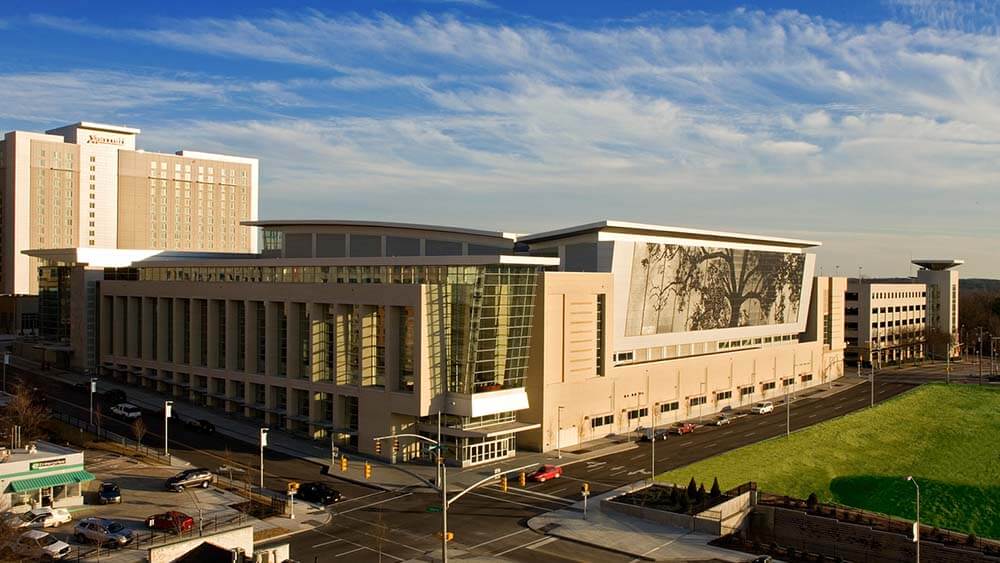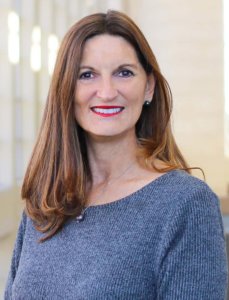
The Raleigh Convention + Performing Arts Complex includes the Raleigh Convention Center, Coastal Credit Union Music Park, Duke Energy Center for the Performing Arts, and Red Hat Amphitheater. (Brian Gassell)
“Venues bring so much variety and diversity to communities and I love having the chance every day to dazzle and create special moments for guests and clients,” said Kerry Painter, director/GM of the Raleigh Convention + Performing Arts Complex in Raleigh, North Carolina. “If I were on the other side of the business, I’d lose the things I love the most about it.”
When she’s not channeling that passion into hosting events, Painter — along with the other dozen-plus women leaders we’ve highlighted in this ongoing series — is working to correct the lack of diversity at the top of her industry. In partnership with the International Association of Venue Managers, Painter founded the 100 + Women of IAVM scholarship program to give more women the chance to level up their career.
“We have sent 35 women [to IAVM’s VenueConnect and Venue Safety and Security School], many of whom would not have been able to attend, network, and participate in the industry to that extent without the scholarship,” Painter said. “We specifically chose Venue Safety and Security School because the security industry, specifically venue security, has seen a low level of women promoted.
“Fortunately, I have a circle of women in the industry who support each other greatly in times of growth, stress, or challenges,” Painter continued. “Together, we have been very intentional in choosing future ‘rockstars’ and consistently connecting and mentoring them so they too can grow into the higher levels of our venues.”
Read on for more of Painter’s perspective on closing the industry’s gender gap, the new challenges convention centers are facing now, and creating a sense of place in an authentic way.
When it comes to leadership in the events industry, there is quite a bit of disparity in the genders who fill those roles — especially facility management. Why do you think that is, and what needs to change in the industry to close that gap? In addition to your skills and capabilities, to what would you attribute your success in a male-dominated sector of the business events industry?

Kerry Painter, director/general manager of the Raleigh Convention + Performing Arts Complex on why the industry benefits from gender equity: “Because it helps us create better, more meaningful experiences for our communities.”
Although it is slow to change, it is changing. As more men retire and gender equity becomes more important to our industry, the International Association of Venue Managers (IAVM)’s salary surveys will hopefully reflect less of a pay disparity between women and men. The largest venues are still primarily run by men, and until that changes I worry pay disparities will continue to exist. However, I see many capable, experienced women in the industry poised to step into those leadership roles as soon as they become available. I can say the same for my BIPOC and LGBTQ colleagues, who also deserve to be in more leadership positions throughout our industry. Developing a sustainable pipeline of diverse talent is critical.
I’m certain the successful leaders are out there, just waiting to be identified, developed, and given opportunities to grow. But here’s the rub: So often the burden of finding talented women, advocating for them, and cracking those glass ceilings falls directly on the shoulders of, well, other women. That’s true of any time we work to improve the outcomes of marginalized populations — those most affected are also most aware of the need for change, and therefore become the ones most determined to make it happen. But, in a vicious cycle, they are also the ones who have the most to overcome, and the most to lose.
In my own career, I have tried to do my best work and hope it shows my value. There have certainly been times when I’ve had to convince people that I was equally capable. And, looking back, sometimes I was not the first choice but when I had the chance to prove my worth, I was ready to humbly accept the opportunity and run with it.
What is the biggest challenge convention facilities are facing right now? What do you see as your biggest opportunity?
Prior to COVID, the biggest perceived threat to our industry was virtual events and other avenues of meeting and doing business digitally. Not anymore! Throughout the lockdowns and social distancing, it was made clear that while it’s possible to do everything digitally, it’s definitely not preferable. Humans are social animals — we need to connect with others. Those spontaneous meet-ups and hallway conversations develop relationships that go so much deeper than a scheduled Zoom call. Studies also show that while thousands might attend an online trade show, it’s those who make the effort to attend an in-person event, interact with the product, and negotiate face-to-face who become customers. More attendance isn’t necessarily more profitable to a vendor or sponsor.
Our client surveys have consistently shown that our greatest asset is our relationships with clients. We have more than 100 annual events each year — clients know and trust our team. We didn’t want to lose that during the pandemic, so we intentionally took the stance of “Relationships First.” We were especially flexible with cancellations, postponements, and helping clients as they got back to live events by offering destination COVID cost assistance.
Leading with “Relationships First” strengthened our clients’ ability to remain in business and be in a strong and viable place when it was time to return in person. Putting relationships first then now helps us fill our venue with bookings which support our community’s hotels and businesses with economic impact, ultimately getting Raleigh’s downtown back on its feet. Our return to events post-shutdown has had some unexpected bumps — lack of available staff, food shortages, and supply-chain issues. But because we have sustained solid relationships, our clients have been so understanding in working with us to overcome the challenges and produce successful events.
Our cover story in the March/April 2022 issue highlighted how the design and functionality of convention facilities is changing because of the pandemic and the evolving needs of groups. From your perspective, what do you predict will change at your facility, as well as at convention centers as a whole?
I’m focusing on how people want to gather in their return to live events. Now that COVID-19 seems to be waning, our staff has revitalized our expansion discussions, which is a great opportunity to meet newer generations in the ways they want to engage. Younger generations want more unstructured gathering places, flexible lobby areas, space to experience vendors and events — not just the typical four walls of a meeting rooms or exhibit halls. How can our space invite creativity and problem-solving in ways that it did not before? How can we accommodate and meet the needs of everyone in this next chapter?
Speaking of four walls and thinking outside of them, we have talked about creating a “sense of place” for years, but it has to be done in an authentic way. We can bring in local food, artists, or products, incorporate neighborhoods and their distinctive attractions, and share the cultures of our neighbors. At their core, convention centers are places of connection — this is where we come together to grow, develop skills, and network. But I think it’s time to take that a step further. If we want to truly elevate our venues into something special, something memorable, we should also create places of community, something that we have all deeply missed in the past two years.
If done with thought and intention, we can create authentic experiences within our facility that not only foster connection but also celebrate the communities in which we gather. So when our attendees go back home, they tell their friends, “That was a great meeting in a really special place. Let’s go back.”
Jennifer N. Dienst is senior editor at Convene. This interview has been edited for brevity.
More Women Leaders
Find more stories from Convene Senior Editor Jennifer N. Dienst’s continuing series on women leaders at convention centers.
